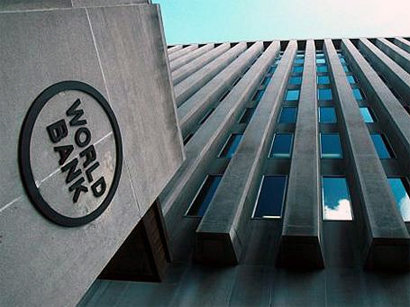WB: Azerbaijan needs efficiency of public spending

By Gulgiz Dadashova
Low oil prices and pressure on the national currency require the private sector of Azerbaijan to overtake the government as the key job creator and driver of the economy.
To make further inroads in developing the economy, Azerbaijan needs jobs, especially those created by a private sector. The government is firmly set to ensure that the environment for business flourishes and brings investments. The focus of the state policy is encouraging investment, ensure that businesses and individuals feeling safe, and respected by the justice system.
The World Bank is discussing with the government of Azerbaijan a set of medium- and long-term measures to move to a new private-sector-led growth model and increase the country’s resilience to external shocks, including the drop in oil prices and the resulting depreciation of the local currency.
The government of Azerbaijan is developing a comprehensive program of structural reforms, and the World Bank, as a long-term development partner of Azerbaijan, stands ready to provide necessary support, the WB Baku office announced about this in an e-mail to AzerNews.
The economy of Azerbaijan has benefited greatly from its oil wealth and progressed significantly in economic growth and poverty reduction.
However, the Bank notes, now since the government no longer enjoys the high level of revenues in oil boom years, it needs to spend less and this will translate to lower economic growth.
Currency also will weaken reflecting weak fundamentals, like in Azerbaijan and other oil-producing countries such as Kazakhstan and Russia. The government needs to sustain the good progress on poverty reduction and promote export-led non-oil sector growth.
With oil revenues high, Azerbaijan has seen its poverty rate fall from 49 per cent to 5 per cent over the past decade. Although still the figure varies around 5 percent, the government drafts a 10-year employment strategy to prevent serious job cuts.
The low oil prices significantly reduced government’s oil revenues and weakened its fiscal position. The WB projections based on oil prices of $30-40 per barrel yields GDP growth in the range of 0.1-0.5 percent for Azerbaijan in 2016.
In the short run, according to the WB, the government needs to curtain spending to maintain fiscal sustainability while sustaining social protection. The government needs to review and re-assess budget activities in view of improving the efficiency of public spending.
In this context the government could undertake reforms to strengthen its capacity in managing spending, so higher efficiency can be achieved. In the long run, the country needs to strengthen its long-term oil revenue management so more stringent rules on spending oil wealth are put in place in future.
Finance Minister Samir Sharifov earlier announced that Azerbaijan plans to amend its budget and cut spending as oil prices fall and the national currency weakens.
Azerbaijan took in 11.6 percent less in budget revenue than it had expected last year because of the decline in oil prices fall, Sharifov said, adding that the government would be reducing spending in 2016-2019 and taking steps to develop the country's non-oil sector.
The 2016 budget sees total government revenues of 14.6 billion manats ($9.3 billion), down from 19.4 billion manats in 2015. Spending of 16.3 billion manats is forecast, down from 21.1 billion manats last year.
Commenting on the performance of the banking system in Azerbaijan during the period of low oil prices, the WB said similarly to the rest of the economy, the banking sector has taken the hit of the oil price decline and devaluation.
The earlier decision of the Central Bank of Azerbaijan (CBAR) in 2012 to increase banks’ minimum capital 5 times, to cool down retail lending (based on the CBAR 2014 decision) and enhance consumer protection have been crucially important and helped to cushion the negative impact on the banking sector.
However, given the external environment and the need to support the growth of non-oil sectors of Azerbaijan’s economy, especially MSME sector, it is essential that the banking sector of Azerbaijan becomes more efficient and competitive and thus increases its efficiency and reduces costs, strengthens capital and liquidity positions, enhances quality of products delivery to the clients.
In this context, the Bank assures that continued consolidation of the banking sector and reforms aimed at strengthening governance, transparency, soundness and efficiency of the banking sector in order to increase financial access and better serve the needs of the economy of Azerbaijan are crucial and supported by the World Bank.
The Central Bank of Azerbaijan withdrew support for the manat, on December 21, triggering losses of 33 percent against the dollar. It had burned through more than half its foreign currency reserves trying to defend it against the effect of falling oil prices.
Azerbaijan has been a WB member since 1992. As of February 1, 2016, the Bank issued loans amounting to $3.785 billion to Azerbaijan. The funds were used to finance over 60 projects. By early 2016, Azerbaijan has used $2.764 billion or 73 percent of all loans drawn via WB. Besides the loans, WB delivered 45 grants totaling $41.586 million to Azerbaijan in 1995-2014.
The level of disbursement of the WB funds in Azerbaijan is 17 percent, which is one of the highest figures in the European and Central Asian regions.
--
Follow Gulgiz Dadashova on Twitter: @GulgizD
Follow us on Twitter @AzerNewsAz
Here we are to serve you with news right now. It does not cost much, but worth your attention.
Choose to support open, independent, quality journalism and subscribe on a monthly basis.
By subscribing to our online newspaper, you can have full digital access to all news, analysis, and much more.
You can also follow AzerNEWS on Twitter @AzerNewsAz or Facebook @AzerNewsNewspaper
Thank you!
